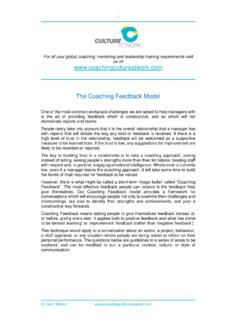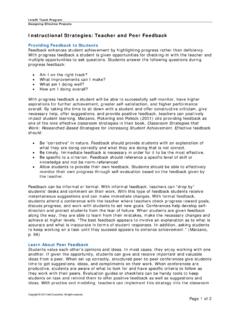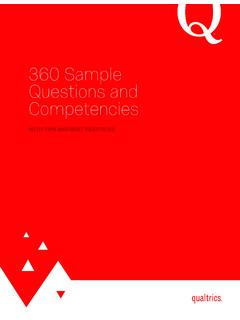Transcription of 5providing feedback for student learning - Curtin University
1 5. Providing feedback for student learning The fifth item in eVALUate asks students their level of agreement with this statement: feedback on my work in this unit helps me to achieve the learning outcomes. feedback includes written or verbal comments on your work. This document aims to assist teachers to provide students with feedback which assists students to learn. 1. What is good feedback ? .. 2 2. Communicating with your students about feedback .. 3 Ensure your students know what you mean by feedback .
2 3 Ensure they know what feedback they can expect from whom .. 3 Ensure they know the timeline for 3 feedback for first year students .. 3 3. Ways to give feedback and manage your 4 Co-opt others to give feedback .. 4 Have students assess 4 Have students provide feedback for each other .. 44 Write a short report for the whole group of students .. 4 Drafting and polishing written assignments .. 4 Provide feedback on selected assignments .. 5 Use a computer mediated programme which provides feedback .
3 5 Use a rubric or an assessment chart .. 5 4. Examples of assessment rubrics .. 6 5. For further assistance .. 12 Using eVALUate to improve student learning Teaching Development Unit, LSN, Curtin University of Technology 2 1. What is good feedback ? feedback is probably the best-tested principle in psychology. [It is] .. most effective when it is timely, perceived as relevant, meaningful and encouraging, and offers suggestions for improvement that are within a student s grasp (Brown, Bull, & Pendlebury, 1997).
4 feedback is any response made in relation to students work such as an assessment task, a performance or product. It can be given by a teacher, an external assessor or a student peer. It is usually spoken or written. feedback is intended to acknowledge the progress students have made towards achieving the learning outcomes of a unit. Good feedback is also constructive , and points students to ways in which they can improve their learning and achievement. Providing a mark or a grade only, even with a brief comment like good work or you need to improve is rarely helpful.
5 Here are more examples of unhelpful feedback (Chamberlain, Dison & Button, 1998). Unfocused comments: Confused Generally sound Adequate Careful how you begin your sentences. Dismissive, sarcastic comments: Did you experiment to find all this? Most of this is straight out of the book. Comments that pass the buck : You need help with your English. See an academic skills advisor. Comments sending mixed messages: Text is based on only a few readings and not on your own thinking.
6 Follow your own advice. Good feedback is focused and students have an opportunity to act on the feedback Hillocks (1986). It is well developed, text specific ( What s your main point here? If it s that you disagree, put that idea up front and explain. (Lunsford, 1997) and provides clear direction: ( Consider integrating these ideas. And Be more specific. Say where and when. (Chamberlain, Dison & Button, 1998) feedback needs to be timely: given early in a unit, or promptly after assessment tasks, so that students have sufficient opportunity to use the feedback for improving subsequent performance.))
7 When approaching the point of feedback , (mentally) ask three things of the student and use these to frame your feedback : What were you trying to do? How did you do it? Why did you do it that way? In general, to give useful feedback : Keep the time between the task and the feedback short When using criteria or checklists for formative marking, keep the criteria clear and simple Balance the positive with the negative Using eVALUate to improve student learning Teaching Development Unit, LSN, Curtin University of Technology 3 Indicate how the student can improve Avoid sarcasm Use simple language 2.
8 Communicating with your students about feedback Ensure your students know what you mean by feedback Be very clear with students that your role as a teacher is not to spoon-feed them, and not to make them do things , but to make their learning possible (Ramsden, 1992). Your role is to inform, question, prompt, assess, encourage and guide your students to achieve the learning outcomes. At Curtin , unit learning outcomes are intellectually challenging, observable and measurable, and made very explicit in the unit outline.
9 They are what students are expected to know, understand or be able to do in order to be successful in a unit. Let your students know that a large part of your role is to provide feedback on their progress towards achieving the learning outcomes. Be very specific with them about how much and what form of feedback they can usually expect, and when. This will be largely determined by your discipline, and the assessment tasks you have designed. Ensure they know what feedback they can expect from whom You might indicate to students, for example, that for an essay or report writing task, they will receive formal written feedback as well as a mark or grade, and that they are welcome to make an appointment with your (or their tutor) for verbal feedback if required.
10 Or, in clinical, laboratory or artistic performance tasks, you might inform students that feedback will be on the spot and verbal, and that they need to be prepared for this by taking notes, asking questions and seeking advice as needed. Make it clear to your students that feedback may come from others as well. For example, you may let students know that they will have two opportunities to demonstrate a particular skill (in performance). The first time, they will receive feedback from a student (or group of students).




